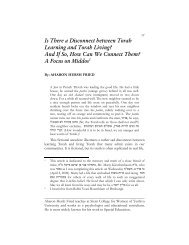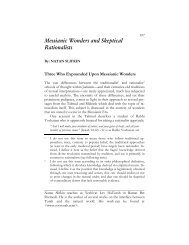Avraham and Sarah in Provence - Hakirah
Avraham and Sarah in Provence - Hakirah
Avraham and Sarah in Provence - Hakirah
Create successful ePaper yourself
Turn your PDF publications into a flip-book with our unique Google optimized e-Paper software.
<strong>Avraham</strong> <strong>and</strong> <strong>Sarah</strong> <strong>in</strong> <strong>Provence</strong> : 245<br />
The Gemara (Megillah 13b) states that, <strong>in</strong> fact, Esther 94 never<br />
ab<strong>and</strong>oned her marriage to Mordechai, <strong>and</strong> when she left Achashveirosh<br />
at night she would return to Mordechai. This means that<br />
Achasheveirosh’s male tzurah did not transform her—she rema<strong>in</strong>ed<br />
constantly under the sway of Mordechai. In the end, Mordechai<br />
(Esther 9:4) also enters <strong>in</strong>to the house of this k<strong>in</strong>g <strong>and</strong> rises to great<br />
<strong>in</strong>fluence there; i.e., the tzurah, the ideals of the Jewish people, will be<br />
accepted by nations of the world. Because Esther/chomer heeds the<br />
words of Mordechai/tzurah, Israel is saved <strong>and</strong> Mordechai’s tzurah<br />
will dom<strong>in</strong>ate the world. This is the story of Israel’s exile <strong>and</strong> eventual<br />
redemption.<br />
It is also important to note that Rambam’s <strong>in</strong>terpretation of the<br />
midrash as be<strong>in</strong>g non-literal is, <strong>in</strong> fact, implied elsewhere (Sanhedr<strong>in</strong><br />
74b) <strong>in</strong> the Talmud, where <strong>in</strong> a halachic discussion the simple render<strong>in</strong>g<br />
of the gemara is that Esther was not married when chosen by<br />
Achashveirosh, <strong>and</strong> only for this reason could she submit to him.<br />
Other Rishonim, assum<strong>in</strong>g that the midrash must be taken literally, proceed<br />
to create halachic reasons as to why she could agree to relations<br />
with him, a gentile, while be<strong>in</strong>g married to Mordechai. Their view of<br />
halachah is affected by an aggadah, that Rambam understood immediately<br />
to be non-literal. 95<br />
Bann<strong>in</strong>g Material?<br />
Based on the ban of 1305 <strong>and</strong> what Rashba wrote on the matter <strong>in</strong><br />
his letters, it would seem that he would consider the above commentary<br />
nonsense, <strong>and</strong> more than that—dangerous nonsense that can<br />
lead to heretical th<strong>in</strong>k<strong>in</strong>g. Rabbi Vidofsky, who put out the modern<br />
version of M<strong>in</strong>chas Kena’os, writes <strong>in</strong> his <strong>in</strong>troduction with considerable<br />
excitement about the importance of gett<strong>in</strong>g this material out to<br />
the Jewish public. He feels that never more than now is this book<br />
94 שורושחא לש וקיחמ תדמוע התיהש ( ברד הימשמ)<br />
אמיל רב הבר רמא ותא הנמאב התיה<br />
יכדרמ לש וקיחב תבשויו תלבוטו.<br />
95 See Tosfos <strong>and</strong> Nimukei Yosef, ibid., also the Kesef Mishneh <strong>in</strong> Yesodei Ha-<br />
Torah 5:3. Because of this midrash, Rabbe<strong>in</strong>u Tam concludes that there is<br />
no violation of the שיא תשא רוסא nor תורזממ when a Jewish wife has<br />
relations with a non-Jew.
















